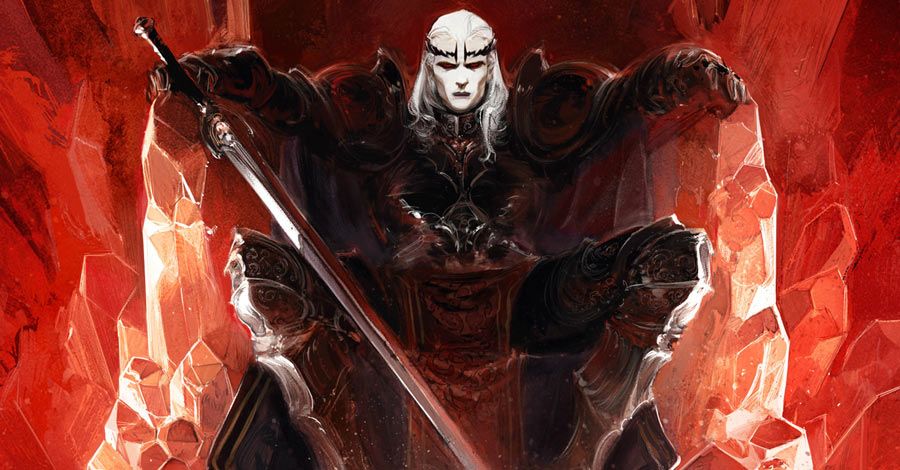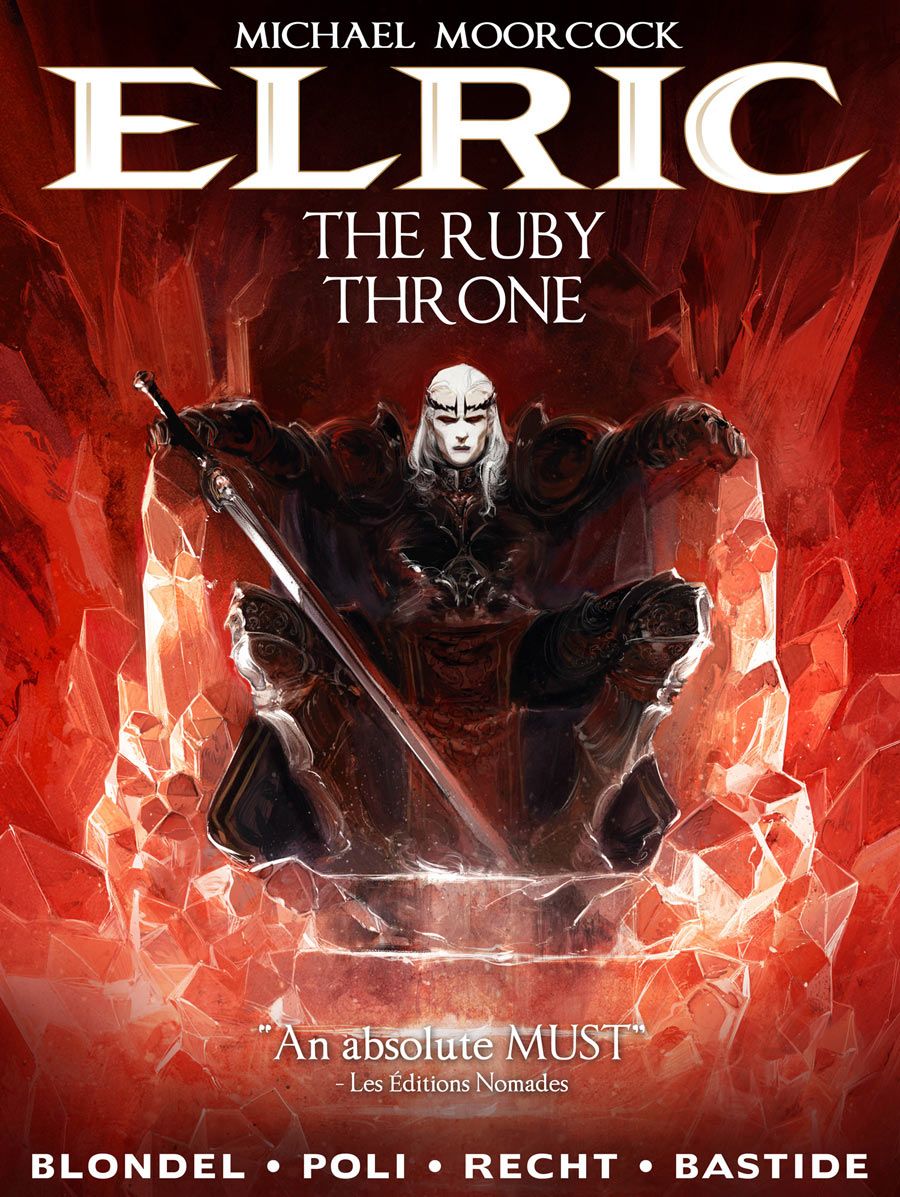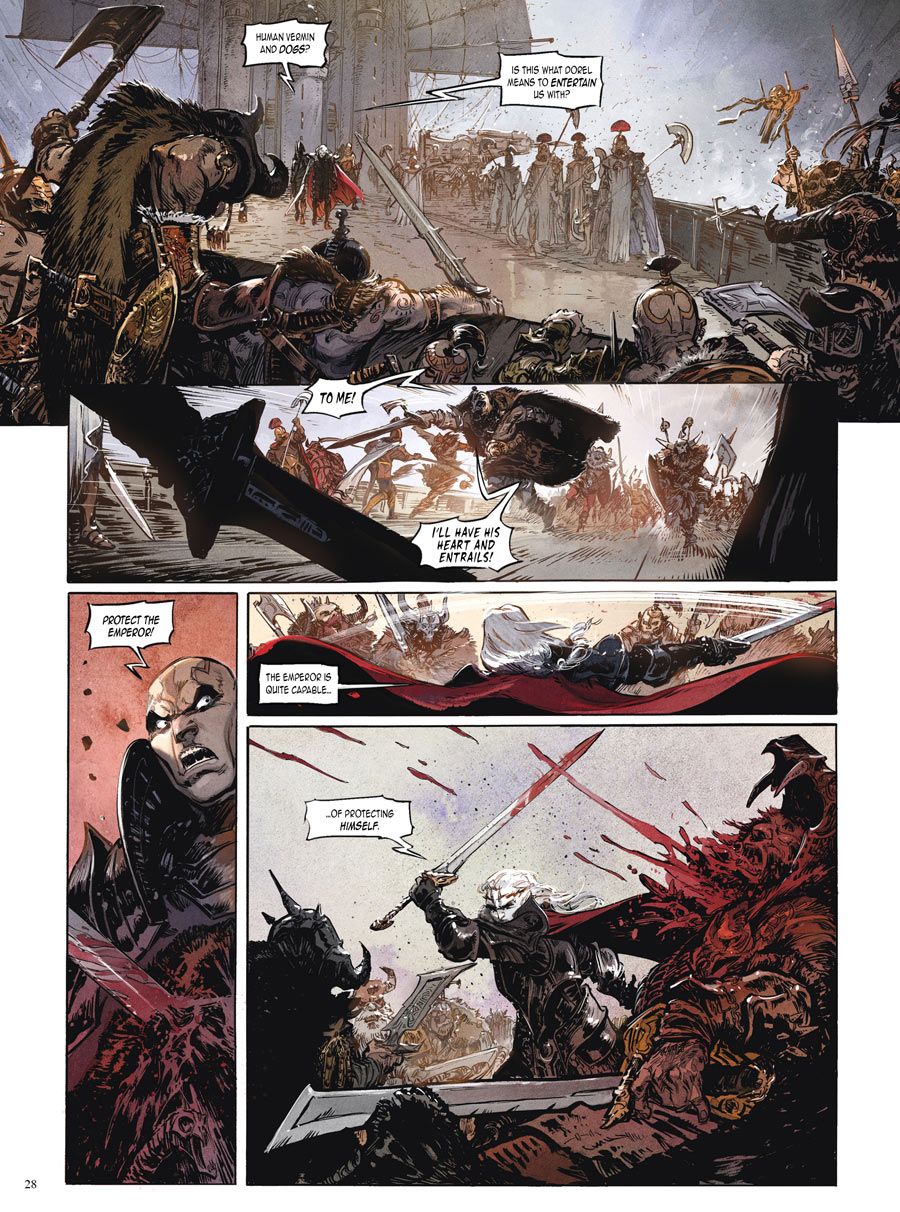This week, Titan Comics unveiled "Elric: The Ruby Throne Vol. 1," the first installment in a four-volume series of comic adaptations of Michael Moorcock's Elric of Melnibone novels. The 64-page hardcover story -- brought to comics by writer Julien Blondel and the art team of Didier Poli, Jean Bastide and Robin Recht -- comes with the full endorsement and cooperation of Moorcock, evidenced by the passionate introduction he wrote to open the narrative.
When "The Ruby Throne" opens, Elric, the albino emperor, has been ruling the island of Melnibone for thousands of years, extending his life and gathering strength through a mixture of magic and herbs. But Elric feels the command of his increasingly more decadent people slipping. Seeing the opportunity to overthrow the emporer, his cousin Yyrkoon, Prince of Melnibone, aims to take the Ruby Throne for himself.
Moorcock's enthusiasm for this take on his stories was readily apparent during our discussion of the project, with the legendary novelist conveying a great deal of admiration and confidence for the creative team involved in the adaptation.
CBR News: In the Acknowledgements, Julien thanks you for "allowing us to torture his universe." How stressful is it to see your work adapted for comics and your universe in the hands of some other writer other than yourself?
Michael Moorcock: Actually, not at all. If those doing the adapting are good -- and I've been very lucky in that respect -- they actually add to the pleasure and reduce any potential stress. Julien, Robin, Didier and the others gave me a great deal back, including some fresh ideas about plotting. I came up through popular fiction, including comics, so I'm used to holding a series in common.
How early in the development of this adaptation did you realize that the art team of Robin Recht, Didier Poli & Jean Bastide were the first to capture "the sense of utter decadence I tried to conveyin the books," as you mention in your introduction?
Very early on. Benoit Cousin of Glenat [Editions SA, a French publisher] came to see me when the guys had only just begun to discuss the possibility of doing the book. He showed me their work. I was impressed, and off we went. These guys are top of their profession.
You also note that the Elric books represent your "rejection of the many moral assumptions with which I was brought up in post-war Britain, an island nation which once ruled much of the known world." To fully appreciate your work, do you think it critical that readers view it with your life experience in mind?
It helps to know a bit about my life, but I tend to think in symbolic, visual terms, and those mean a lot of different things to readers. Yes, it probably illuminates the odd facet of the books to know that I have always identified most closely with Elric, out of all my fantasy heroes/anti-heroes.They were planned in the spirit of examination as well as romance. But most people know nothing about me and say they enjoy the work, so I guess the answer's "No."
You also wrote, "I came to science fantasy because I liked the way it could be fashioned to question my world and contradict authority." Do you think many of the new writers in science fantasy appreciate the power that it can have to challenge authority?
My own belief is that books sell pretty much according to the amount of content they have. The greater the content, the smaller the audience. In order to attain its dominant place as a form, science fantasy had to dump content. Most modern genre novels seem "just good stories" (and litfic is a genre, in my view). "Galaxy" magazine in the '50s and '60s set out to challenge authority and, like comics now, flew under authority's wire often very successfully. In his day, most of Phil Dick's books sold in modest numbers.Most genre books are just story. I suspect a greater proportion of urban fantasy is more inclined to challenge vested interests.
Are there any particular scenes in the adaptation that pleasantly surprised you in terms of how well they were executed?
I liked the opening sequence, showing Elric's birth and Sadric's pain, as well as various summonings and so on, the often subtle shades of variation in plot.
What is it aboutJulien Blondel's approach to writing that makes him a perfect fit for the adaptation?
He has a romantic sensibility and his grounding in games has given him a strong sense of structure.
I think it safe to say anyone that accepts the honor of adapting your work is intimidated on some level at the prospect of working with you. Are you still surprised when folks are intimidated or nervous, or does it just come with the territory of being as successful a storyteller as you are?
I know it happens, of course, because people tell me, but people rarely stay intimidated by me. We quickly become friends. I am on very friendly terms with Benoit, Julien and Robin, for instance, and we still see a fair bit of one another.



